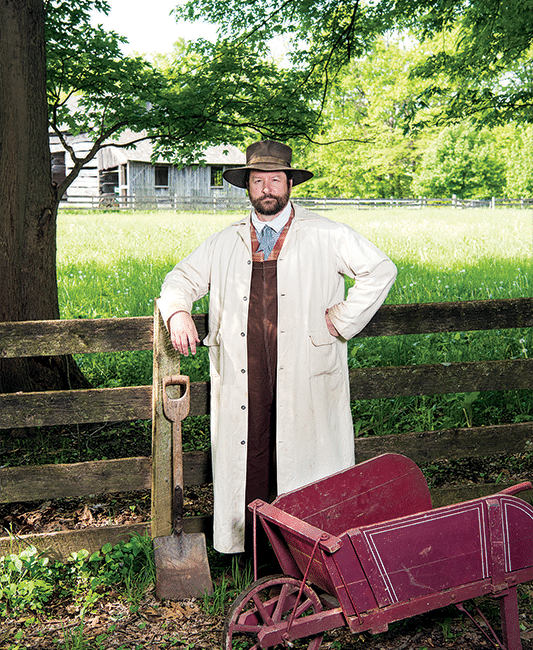Bill Wilkinson, Historical Interpreter

For the Conner Prairie actor, the past is a present that keeps on giving. Tony Valainis
The clothes are hot, the food stale, and the Confederate army may return for a second pummeling, but Bill Wilkinson keeps coming back to Conner Prairie to relive the same day, July 13, 1863.
His character is Ambrose “Mutt” Sallie, a farmer in Dupont, the only part of Indiana that saw military action in the Civil War, when Confederate soldiers looted the town for food, supplies, and horses. Sallie greets guests with coveralls, a duster coat, and a smile. “Good day, folks. How are you all? You thinking of joining up with the Union Army?”
Most guests are not.
While playing his doppelgänger, Wilkinson draws from his own life experiences. Sallie is 50. So is Wilkinson. Sallie lost his wife. So did Wilkinson. (He remarried and has two children.) Of course, there are limits to the parallels. While Sallie is a farmer, Wilkinson moonlights at ComedySportz in Indy. He is also a trained clown.
Being an historical interpreter—a mix of acting, reenacting, and improv—has its challenges. There is no script. You have to stay in character all day. You can’t slip up and go all 21st century. That means no cell phone. No wristwatch. No zippers. No Google fact-checking. Nothing is “awesome” or even “OK.” Even harder, you never know what random questions children will lob.
“Are you a train robber?”
“Do you know Fortnite?”
Or the one that really stumped him. “Do you know what glitter is?” Wilkinson wasn’t sure if Sallie would have known about glitter. That night, he looked it up and learned glitter was invented in 1923, but Sallie might have known about the mica that Egyptians used in painting.
Impromptu encounters turn serious when guests bring up slavery or the toppling of Confederate statues. Then there are the dads—it’s almost always dads—who grill Mutt to see if he’ll goof up.
“What year were you born?”
“What’s the price of bread?”
The good farmer is unfazed. “If they’re asking questions, that means they are in it with you,” Wilkinson says. “That’s a wonderful place to be.”
Or as Jim Banta, 29, aka Colonel Ogden, explains after his Springfield rifle misfires: “You never know what’s going to happen in the field. You learn to flow.”
The worst part of an interpreter’s job? The heat. Even when temps top 90 degrees, Wilkinson never so much as rolls up his sleeves, especially around women. “My goodness,” he says, looking affronted. “We just met.” Worse, short sleeves would reveal his wrist tattoo—98 percent—the supposed percentage of things we worry about that never come to pass.
“You aren’t supposed to notice that,” he says.
I suggest a cover-up Band-Aid.
“We don’t have those right now,” he says. “A cotton bandage!”
Over the past six years, Wilkinson has read up on Civil War history. If he could wave his magic wand, he’d return to 1863 to listen to his favorite historical figure: Ulysses S. Grant. “I would give anything to hear what the timbre of his voice might have been,” he says.
Conner Prairie is a peaceful place. Amid the wood-frame houses and roaming turkeys, you can leave the city behind. Some guests leave reality behind as well. Like one teenage boy on the autism spectrum who became convinced that several Dupont villagers were spies, a side plot the actors sometimes incorporate.
“He got very into it and began arresting people,” says Wilkinson. “We tried to redirect him, but it was difficult to do because that’s a very exciting storyline.”
Luckily, the staff keeps discharge papers on hand for just such emergencies. Three soldiers lined up, read the documents, and formally released the boy.
The teen looked up and said, “You mean I can go home?”
“We were floored,” Wilkinson says. “The hair stands up on my head right now thinking about it.”
Wilkinson gazes over the pasture. His brown eyes match his soft felt hat.
“Somewhere here today something like that will happen,” he says. “We know that because of the connections we make. These people want to be here. They want to play. They want to learn.”
Ten minutes later, it does happen. A boy in a Spider-Man shirt walks up with his parents. Wilkinson explains the art of dunking hardtack (a kind of biscuit) so you don’t break a tooth. Adhering to his rule of never talking down to kids, Wilkinson asks the boy if he likes coffee.
“I drink coffee some,” he says.
His parents laugh and they totter off to the field hospital where Ogden shows off the saws used to amputate limbs.
“That’s beautiful,” Wilkinson says. “He’s playing our game.”





